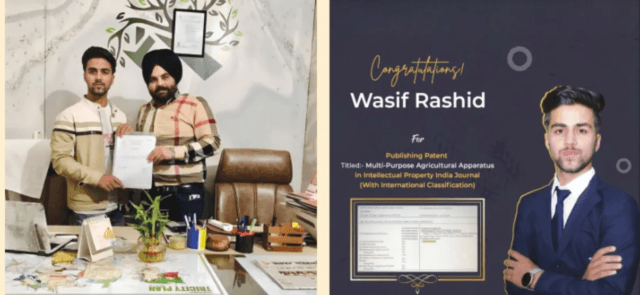Srinagar, June 22: In north Kashmir’s Sopore, far from the spotlight of industrial innovation hubs, 22-year-old Wasif Rashid is quietly making national headlines. The young entrepreneur from Jammu & Kashmir has been granted an Indian Patent (IN202211049323) for a Multipurpose Agricultural Apparatus.
This simple, sturdy tool may hold the key to easing the lives of millions of Indian farmers who still work the land with their bare hands and a handful of ageing implements.
The tool, designed and refined over several years, blends seven commonly used farming tools—a spade, hoe, axe, hammer, mallet, crowbar, and nail plier—into a single stainless steel, rust-resistant apparatus that is both lightweight and modular. It can be twisted, angled, and adjusted based on the task at hand, drastically reducing the need for multiple tools, lowering physical fatigue, and cutting down equipment costs by up to 70 percent.
Wasif’s journey to innovation didn’t begin in a lab or a university workshop—it began in the orchards and fields of North Kashmir, where he spent his childhood.
“I did my schooling in a small school in North Kashmir,” he recalls. “From childhood, I wanted to do something different. While many around me dreamed of the usual paths—medicine, engineering, or government jobs—I was drawn toward things people often overlooked. For me, innovation was not about fancy technology. It was about solving real problems, especially for those who work the hardest.”
He speaks of his early fascination with tools. “I would often visit farms during apple harvesting seasons, and I remember how the elders would carry heavy bundles of tools just to manage basic fieldwork. I used to think—what if all these could be in one hand?”
This childhood observation turned into a mission as he grew older. Alongside managing his business, The Asian Real Estate, Wasif spent late nights sketching designs, testing prototypes, and most importantly, speaking to farmers directly.
“I didn’t want to build something from a desk. I travelled to rural pockets across Kashmir and Punjab, watched how labourers worked, how tools broke, how fatigue set in,” he says. “One farmer told me, ‘Hamare haath to thak jaate hain, beta, par kaam rukta nahi.’ That stuck with me.”
What emerged was a rugged, rainproof device tailored for the real conditions of Indian agriculture. The tool’s three-directional connector allows the head to be fixed at any required angle—whether a farmer needs to dig, chop weeds, hammer in fencing posts, or pull out stubborn nails from wooden planks. An inverted V-notch was added specifically for removing stones or lodged materials from the soil—something Wasif says was based entirely on field feedback.
Though Rashid now manages a growing real estate venture across North India, he says this invention has a different meaning altogether.
“Land is something I work with every day in my profession. But this is about the people who live off that land,” he says. “There’s a deep connection between where I come from and what I’ve made. This tool is not just steel and screws—it’s rooted in the dust and struggle of small farmers.”
He recalls the first time a prototype was used in the field. “A farmer from Kupwara called me a week later. He said, ‘Wasif bhai, pehli baar laga zindagi thodi asaan hui.’ That one sentence made every setback and sleepless night worth it.”
The patent, issued by the Indian Patent Office, is more than just a legal recognition—it is a national nod to a homegrown solution designed for India’s 86 percent small and marginal farmers who often don’t have access to tractors or expensive mechanised tools.
Currently, Rashid is working with agricultural experts and innovation platforms to bring the device to market. Discussions are underway with Krishi Vigyan Kendras, rural startups, and non-profits to help ensure the tool reaches the very hands it was designed for.
Officials from the National Innovation Foundation – India have welcomed the patent, noting that innovations like Rashid’s are crucial to bridging the gap between technology and the rural economy.
In an age where innovation is often synonymous with artificial intelligence and urban labs, Wasif Rashid’s invention reminds us that true progress sometimes comes from listening, not to machines, but to people.
“I never wanted to leave my roots behind,” Rashid says, his voice steady. “If anything, I wanted to take them with me—into the future.”








